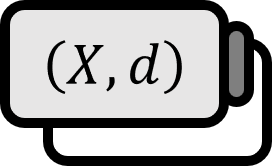Continuity and Compactness in Metric Spaces
Theorem
Let $X$ be a compact metric space, $Y$ be a metric space, and $f:X\to Y$ be continuous. Then $f(X)$ is compact.
The compactness condition cannot be omitted.
Proof
Let $\left\{ O_\alpha \right\}$ be an open cover of $f(X)$. Since $f$ is continuous, by the equivalence condition, each preimage $f^{-1}(O_{\alpha})$ is also an open set in $X$. Therefore, $\left\{ f^{-1}(O_{\alpha}) \right\}$ is an open cover of $X$, and since $X$ is compact,
$$ X \subset f^{-1}(O_{\alpha_{1}})\cup \cdots \cup f^{-1}(O_{\alpha_{n}}) $$
there exists $\alpha_{1},\cdots,\alpha_{n}$ satisfying the above equation. Thus, by the definition of preimage, the following is true:
$$ f(X) \subset O_{\alpha_{1}}\cup \cdots \cup O_{\alpha_{n}} $$
Hence, $f(X)$ is compact.
■
Corollary
Let $X$ be a compact metric space, and $\mathbf{f} :X\to \mathbb{R}^{k}$ be continuous. Then $\mathbf{f}(X)$ is closed and bounded. Also, $\mathbf{f}$ is bounded.
Definition
Given a real-valued function $\mathbf{f}: E \to \mathbb{R}^{k}$, if for every $x \in E$
$$ \left|\mathbf{f}(x) \right| \le M $$
there exists a real $M$ satisfying the above condition, then $\mathbf{f}$ is called bounded.
Proof
By the equivalent condition for compactness in Euclidean space and the theorem above, $\mathbf{f}(X)$ is closed and bounded. Since $\mathbf{f}(X)$ is bounded, $\mathbf{f}$ is also bounded.
■
